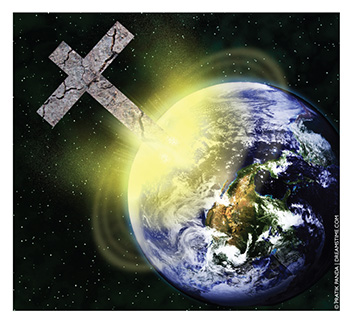According to a Newsweek study, 40 percent of the people in the US think the world’s going to end in their lifetime. Their descendants are not a consideration, it would seem. The claim is that religious faith that motivates this view; I believe it to be guided more by ignorance and world-fatigue. I am world-fatigued, too, and that does not excuse me from concern over what the world might be like for my nephew’s children in 50 years in the event that the Book of Revelations is nothing more than the obscure rantings of a holy man suffering from a delusional mental condition.
The future of man, the outcome of his impact on this planet and it’s ecosystems, is very much on the mind of composer John Luther Adams, who has stated that composing is an act of faith, but faith in the future of mankind. This could sound all very Age of Aquarius, except that it’s not.
Thomas Mann’s ‘Doktor Faustus‘ develops this question about man’s simultaneous impulse for both creation and nihilism. I found in it’s pages a nostalgia for the notion that humanistic philosophy is the crucible where the future of man outweighs the decadence of the times one lives in. In the novel, the fictional composer Adrian Leverkuhn creates a large work titled Apocalypsis cum figuris, intended as a final devastating blow to the An Die Freude (‘Ode to Joy’) in the Finale of Beethoven’s Ninth Symphony. Leverkuhn had been a theology student prior to his career as a composer, and so knew of this contradictory impulse in man’s nature (here finely calibrated as a portrait of the ‘German’ soul. Mann wove this anti-humanism into a larger parable for the catastrophe in Central Europe in the first half of the 20th Century, but it’s core argument is applicable to modern life.
When I read that such a large part of the American electorate has such surety about the future of the planet, and that this is tied to an eschatology learnt in churches, it makes me less than optimistic about addressing long-term problems such as climate change and projected shortfalls in Social Security solvency. It seems that it is a sort of myopia, self-induced by laziness, indoctrinated by fundamentalism, uncaring in it’s desire to get easy answers and then consume resources and pollute with aplomb. To be so certain about the future of man therefore is the worst form of selfishness and self-justification. Why make hard ethical choices about consumption of resources and despoiling of the environment if God’s going to blow it all up and start again, anyhow?
This, then, is the crux of the matter facing composers now, at least the composers who write music is intended to be listened to, and not just heard. No one can fault the one who composes to raise a little cash, or raise one’s public profile a bit in order to secure some career aims. That’s part of the life. When one considers, however, how heavy the lifting is for making large works for perhaps one premiere opportunity and how many of these products of toil and Big Ideas now line the obscure corners of academic music libraries, it becomes incumbent on the artist to consider if the work, and mankind itself by extension, indeed has a future. The usual teeth-gnashing about the ‘future of classical music’ and so forth are merely a proxy for the larger question.


